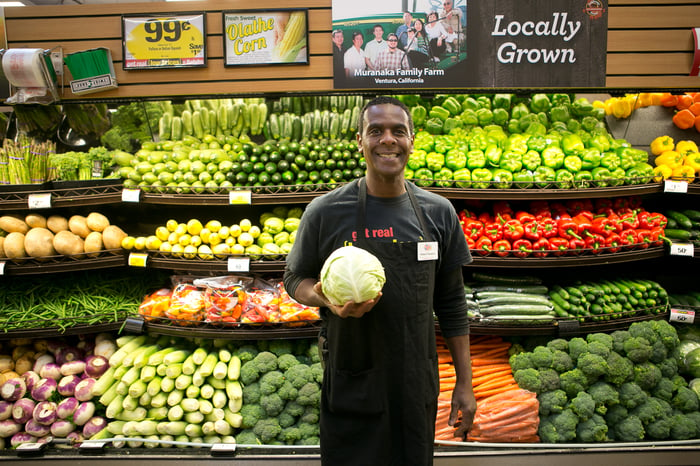Amazon.com (AMZN -2.96%) is preparing to run away with the grocery industry. The introduction of two-hour grocery delivery at Whole Foods Market through Amazon's Prime Now service shows that unless Kroger (KR 1.77%) moves fast and decisively, it is going to be left behind in this space.
A fresh start for groceries
Amazon Fresh, the online retailer's virtual grocery store, grew 35% to $135 million in just the last four months of 2017, primarily as a result of its acquisition of Whole Foods last summer, according to The Wall Street Journal. Just putting a few thousand products from Whole Foods' discount 365 brand on its virtual shelves caused a customer stampede at the online grocer, and it sold out of most goods. Now, it will start delivering groceries from Whole Foods in just two hours for Prime members.

Image source: Getty Images.
The new service will be available in only four markets to start: Austin, Cincinnati, Dallas, and Virginia Beach. But there are plans to roll out delivery to other markets later this year, and it probably won't be long before Whole Foods delivery will be available wherever there is a Whole Foods Market.
Kroger needs an effective response to this challenge. As the largest pure-play supermarket chain in the country with nearly 2,800 stores, making it significantly larger than Whole Foods' 470 stores, it still lacks a capable grocery delivery system that can supplement its click-and-collect ClickList pickup service. Because Amazon seems intent on expanding its own supermarket footprint, both online and in physical locations, Kroger needs a new, coherent strategy.
Strength in numbers
There are hints Kroger is at least looking in that direction. It was recently reported that the supermarket chain was in contact with Amazon rival Alibaba (BABA 0.22%), the Chinese e-commerce platform that is also reportedly looking for a foothold in the U.S. to challenge its competitor. Although it was seen mostly as an avenue for Kroger to expand into China, a partnership with Alibaba would make just as much sense, if not more, for a coordinated strategy here in the U.S.
Those talks apparently went nowhere, but Alibaba isn't the only play Kroger can make. In fact, the supermarket giant has several opportunities available.
When Amazon announced its acquisition of Whole Foods last summer, retail and supply-chain consultant Brittain Ladd suggested Kroger had several paths open to it, not least of which was a partnership or merger with either Costco (COST -0.71%) or Target (TGT 0.77%). Kroger is one of several chains that he believes need to "think big" and go beyond just incremental change.
Ladd has said Amazon could very well be the biggest grocery store brand by 2030, and it could effectively do so by acquiring Target itself, which would give it the footprint it needs and allow it to open Whole Foods stores inside Target. Kroger needs to strike first.

Image source: Kroger.
Time to be bold
A merger with Costco would give the supermarket leader warehouse and fulfillment capabilities that could turn its grocery stores into distribution centers, similar to what Walmart (WMT 0.26%) has done with its 4,000 U.S. stores. It's likely one of the reasons Kroger was looking to acquire Boxed, the upstart online bulk-order warehouse. That Boxed reportedly rejected the overture in favor of soliciting an offer from Amazon suggests that if Kroger wants to think big and outside the box itself, approaching Costco might be an option.
Particularly in light of Target's recent acquisition of delivery service Shipt, a recommendation Ladd made last summer, the mass merchandiser could be an attractive candidate for Kroger as well. Target's 1,800 stores would help blanket the nation in a way that would make it difficult for Amazon to counter. That it would also keep the retailer out of Amazon's hands also commends the strategy.
As Ladd suggests, a merger between Kroger and Target would give the latter "access to the best grocery retailer in the United States, and Kroger would be able to create a near-endless aisle of grocery and retail products for their customers, thus increasing Kroger's value proposition."
Kroger seems to want to do this on its own, adding apparel and exploring store-in-store shops with Ace Hardware. It might not be as comprehensive as a partnership or merger with Alibaba, which would span food, merchandise, and technology, but a strategic alliance or merger with either Costco or Target could be the big idea Kroger needs to keep Amazon and Whole Foods Market at bay.




